Analysis of strategic position on International management consultancy
Introduction:
In the modern business world, consultancy firms use effective strategies management and leadership approaches that are useful in meeting their client's needs and establishing a good position in the international market. Here the study will represent the strategic analysis of the selected consultancy firm, the International Management Consultancy (IMC) by carrying out the internal and external environment analysis of this company. strategic analysis of IMC also includes a comprehensive discussion of the strategic position this consultancy company by discussing its leadership and management process, company's culture, company's position in the consultancy sector and its client needs. Then this study will make suitable recommendations based on the strategic analysis of IMC in terms of recommending effective leadership and communication strategies that can be used by the marketers of this company to grab a strong competitive position in the international market and meet the customer's needs. If you require guidance throughout this process, seeking marketing dissertation help can provide valuable insights. Then the study will discuss how the recommendation can be implemented in an effective way to assist IMC to develop a strong position, finally, the study will present a suitable conclusion which will summarise the underlying aspects of the entire content.
Section 1: Analysis of strategic position on International management consultancy (IMC):
IMC or International management consultancy s is a UK based consultancy firms that provide professional advice to its clients. It has several clients across the world that includes. Small and medium businesses, large multinational companies, large corporate houses and large technology-based firm. This company is associated with assisting the clients to improve the performance of staff's and managers. IMC provides advice and guidance to its clients regarding the implementation of effective management and leadership system that are helpful forth civet to develop their competitive position in the international a market improve their productivity. The mission of IMC is to assist its client to develop the effective business as well as a management strategy, maintain the conduct and professional accountability and improve the competitive position in the global business market that is crucial for them to improve their overall business.

Internal environmental analysis of IMC:
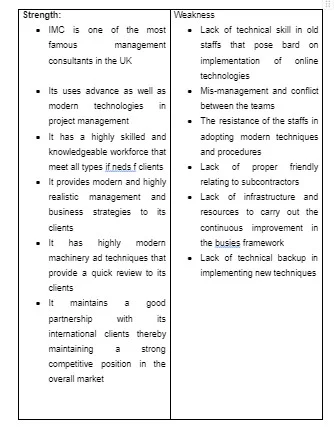
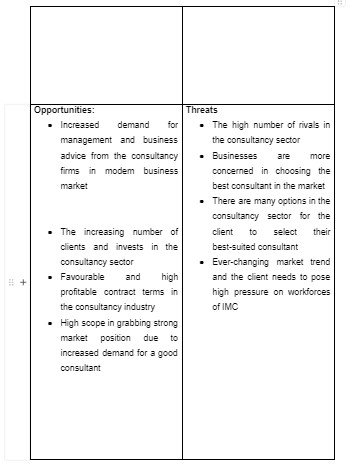
From the above-mentioned SWOT analysis, it can be stated that IMC has both the opportunities and threats in the market. While it comes to improve the business position in the international market, marketers need to shape up their strength and enhances the usefulness of the opportunities to enhance their business sustainability (Aguinis et al. 2017). It has several strengths that assist this company that enhances its scope in grabbing a highly competitive position in the global market. Some of the strength of this company is it is a well-known reputation in consultancy sector in the UK, its skilful workforce, its modern techniques and procedures, its realistic guidance to its client and its strong relation with its international investors and clients. On the contrary Albers et al. (2017) argued that while analysing the international environment, marketers of a company need to consider the threats and weaknesses of the company which will assist them to analyse the internal status of the company. Here marketers of IMC need to focus more on improving the skill and abilities of the entire workforces including the old and new staffs to use new and modern technologies. In this context, managers of the consultancy firms need to conduct the training and skill development for the staffs which will assist them to enhances the skill and knowledge in using the modern technologies in an effective way (Ansoff et al. 2018). In addition to this, managers of IMC need focus on managing mismanagement and conflict within the team t by using the suitable leadership and management style thereby directing the entre workforces to work towards achieving the company organisation goals rather than focusing on individual goals. Although IMC successfully the online technologies such as social media and online to maintain the effective connection with their investors and clients, this company needs to focus on improving its infrastructure as well as organisational resources through discussing with its stakeholders.
External environmental analysis of the IMC

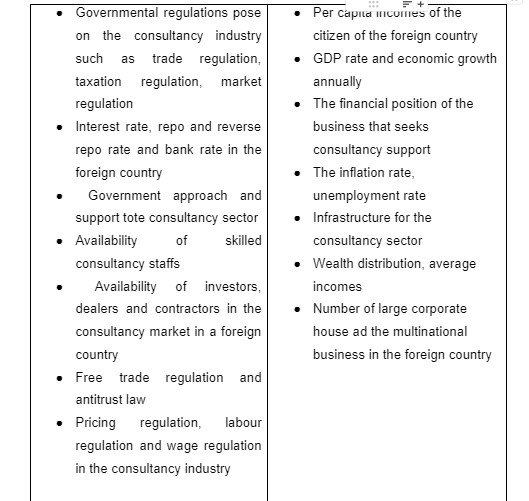

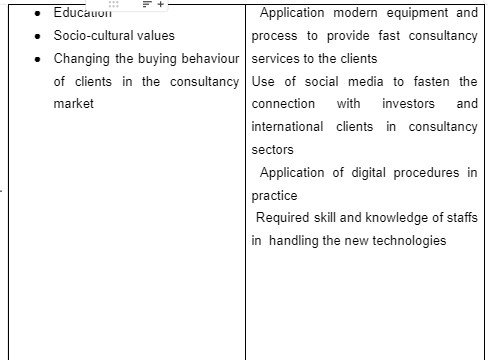
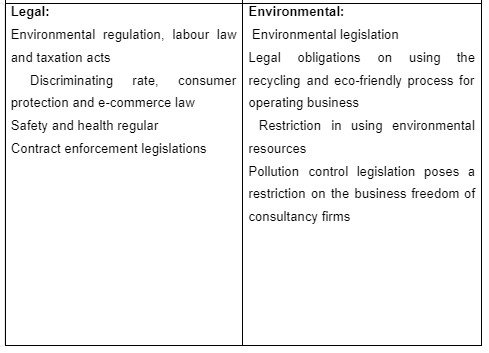
From the above-mentioned discussion, it can be stated that while going to operate in a foreign country, IMC needs to focus on the different external environmental factors such as political, legal, economic, social, environmental and technological factors. While operating in the foreign market, marketers need to consider the level of political fairness in a foreign country. On the other hand, political stability needs to be considered by the marketers of this firm (Bergh et al. 2016). For operating smooth and hassle-free business operation in the foreign market the country must have a stable and fair government that will provide the fair business opportunities to the marketers. On the other hand, economic factors are the most important aspect that needs to be considered by marketers of IMC while operating an international business, in this context marketers of this company need consider the GDP growth, economic stability, average income of its countrymen, the number of multinational companies in the country and the demand of consultancy firms in the country. Marketers need to select such country for operating the business operation of IMC in which there would be stable and high economic growth and the high number of multinational companies that will enhance the chances of profits of this company. On the other hand, marketers need to consider the regulations that are posted on consultancy firms while operating on a foreign country such as environmental regulation, labour law and taxation law. As mentioned by Banihashemi et al. (2017) marketers of a consultancy firm need to select such country for operating the international operation, in which the legislative system is highly liberate and supportive to the industry. Marketers of IMC also need to focus on the technical, environmental and social aspect in the country in which it is intended to operate its business. IMC needs to improve the skill and ability of its workforce to handle the new technical procedures to operate the business.
The strategic position of IMC:
Leadership and communication:
Managers and leaders of IMC believe in maintaining such leadership and communication framework in which the decision, opinion and skill of the staffs can be included. Here organisational leaders generally use the democratic leadership styles which assist the company to include its staffs in the decision-making process. Democratic leadership style is widely used in the modern business world, which assists marketers of multinational firms to allow staffs to use their diverse skill, abilities and decision making to develop innovative business strategies that assist the entire business to deal with current market challenges (Bettis et al. 2016). On the other hands, organisational leaders of IMC also need to implement a transformational leadership style. Through using the transformational leadership process, manages and leaders of the consultancy firm can make effective modification as well as the transformation of skill, abilities and work process of staffs, which assists the company to enhance its overall productivity. Organisational leaders of IMC believe in maintaining effective communication and information delivery system within the workplace that will assist all the staffs as well as a manger to get all the up-to-date information regarding their client and investors in the international market.
Company culture:
Company culture and workplace environment include t overall productivity and operation of a business. IMC believes in developing creative and positive organisation culture which will provide its employee with equal and discrimination-free workplace that is highly effective for their personal and professional development. Organisational leaders of IMC always maintain a well-disciplined and orderly environment in the workplace in which employees can work in collaboration with one another with an intention to achieve the common organizational goals. Here the workplace culture is highly productive and creative which encourage the innovative and diverse skill of staffs. Additionally, the IMC provide a bias-free and fair work environment to staffs in which they are protected from any kind of bully, abuse and harm.
Company's position in consultancy sectors:
IMC has a good reputation in the UK and global consultancy sectors that are considered as one of its great strength. It has good market repatriation in international consultancy market which enables it to get new clients in ever years. The marketers of IMC believe in using the new technologies and modern procedures which enable this company to provide high quality consultancy service to clients. It has several happy clients in the UK as well as outside the UK. Its string project management framework, modern techniques in dealing with its clients and realistic consultancy guidance make this company a well-known and reputed consultancy firm in the UK and international market.
Critical reflection on PESTEL and SWOT:
Strength of SWOT analysis of IMC is it will assist its marketers to analyse the strength and areas of improvement of this company, which will assist them to develop such market and management strategies that will be helpful in grabbing strong market position (Bromiley et al. 2016). Limitation of the SWOT analysis of IMC is that, marketers do not consider the other internal factors such as their resources management, financial condition, relationship between the mangers and staffs. The strength of PESTEL analysis is it assists the marketers of IMC to consider the above-mentioned external factor while operating its business in any foreign marker. The limitation of this technique is that it is unable to include the other external factors such as the relationship of the IMC with int international investors and clients.
Issues that IMC face:
Based on the strategic analysis following issues can be identified:Resistance of old staffs in adapting to the new technologies and procedures is the major issue that IMC faces. Here managers need to conduct the skill development program that will enhance the skill and professional standard of these old staffs to handle and use new technologies while providing consultancy service to the clients. Lack of resources and proper technical infrastructure of IMC that is important for applying the digital process in its business framework. High level of market competition in global consultancy sector due to developing high number of potential rivals.
Section 2: Recommendations
- Marketers of IMC is recommended to develop strong resources management framework that will assist the company to manage its financial and physical resources according to the ever-increasing demand of clients in the global consultancy industry. For example, modern multinational corporate business now seeks online management and business support that will enable them to cope up with the ever-changing needs of their customers in the market. In this aspect, IMC needs to manage consistent cash flow into its business framework to use highly modern online technologies in terms of meeting the needs of clients.
- Marketers of IMC is recommended to modify the overall leadership and management system which will assist the company to manage and lead to staffs in such a way that will enhance their skill, professional ability and flexibility to work in any market environment.
- Skill and productivity enhancement of the workforces are recommended to the IMC, through which it can make highly skilled workforce that can easily track the current market trend and ill set the relevant strategies that are needed to grab the strong competitive position in the international market.
For implementing the effective resource management framework, organisers leaders of IMC need to conduct thorough research on the internal environment. The internarial environmental analysis will assist the organisational leaders of IMC to determines the current financial condition, cash flow, number of staffs and other physical resources in this company. Additionally, managers need to make effective external environmental research which will assist them to understand which resources are needed by this company to meet their client's needs For implementing the better leadership and management process, organisation leaders of IMC can use transformation leadership styles here organisational managers of this consultancy firm would emphasize on making positive transformation of the skill, professional knowledge and ability, which will enhance the productivity of the workforce (Kerzner (2019). In this context, staffs need to be provided with proper raining skill development opportunities that will shape their existing professional skill and develop innovative skill. In addition to this, IMC needs to implement the autocratic leadership when it is needed to develop the well-disciplined framework in workplace in which managers make the final decision which is strictly needed to be followed by staffs. Skill and productivity enhancement can be achieved through carrying out regular interaction with staffs in terms of understanding their strength, weakness and issues they face during work. Through review and monitoring, mangers of IMC can determine the performance of the entire workforces which will assist them to discuss the process and strategies with the staffs that will enable them to develop their professional standard. On the other hand, through providing staffs with self-assessment training, organisational leaders of IMC can enhance the overall productivity as well as creativity of the workforces that will contribute to grab strong competitive advantage in international market. Managers of IMC need to also improve the level of communication with their stakeholders in discussing the strength, weakness and opportunities of this firm in global consultancy sector. Through maintaining effective communication with the stakeholders, marketers of IMC can improve their overall relationship with international investors which will enhance the overall cashflow into the company. On the other hand through developing effective communication among all the employees, it is possible to make a synergetic workplace in which employee can share their decision, abilities and skill, which can not only enhances their productivity but also assist the company to develop innovative strategies to deal with current market changes in the international market.
Section 4: Critical reflection:
Here I am going to use the Kolb learning cycle in terms of reflecting my experiences and learning that I have gathered throughout the module.
Experience:
Throughout the module I have gathered both positive and negative experiences which assist me to evaluate my strength and weakness. Teamwork is one of the good experiences that I gathered during the module which assist me to learn how to work synergistically with the team members and manage the conflict with the team. The negative experiences that I gathered are the disagreement and conflict within team while working on this project that impacted on my emotion and psychology. Through these experiences I have learned how to overcome the conflict within team by using useful strategies to maintain collaborative work environment in workplace.
Reflective observation:
I feel that during the teamwork o this project I need to work more on my interactive and verbal communication skill that is important to express own views in front of the team members. I also realise that I needed to be more presentable and punctual that could help my team members to accomplish the project before deadline.
Conceptualisation:
Throughout the module I have developed my written communication skill that will assist me in near future to make any kind of formal documents or written statements. Additionally, the module helped me to develop my time management, reasoning and critical analysing skill, that will assist me to understand the underlying meaning of any task before starting it.
Active experimentation:
All these skills and knowledge that I have gathered during the module will assist me to develop strong career opportunities near future. The verbal and written communication skill that I have developed will assist me to maintain effective communication with my colleagues in future workplace.

Conclusion:
From the above-mentioned discussion, it can be concluded that, strategic management is important for any consultancy firm to develop effective strategies that will enable the firm to achieve the common organisational goals. Through analysing the internal and external environmental factors, marketers of a consultancy firm can develop effective market strategies that will be helpful to grab strong competitive position in the international market.
Continue your exploration of A Strategic Analysis of GAP Inc with our related content.
Bibliography:
Aguinis, H., Edwards, J.R. and Bradley, K.J., 2017. Improving our understanding of moderation and mediation in strategic management research. Organizational Research Methods, 20(4), pp.665-685.
Albers, S., Baum, H., Auerbach, S. and Delfmann, W., 2017. Strategic management in the aviation industry. Routledge.
Ansoff, H.I., Kipley, D., Lewis, A.O., Helm-Stevens, R. and Ansoff, R., 2018. Implanting strategic management. Springer.
Banihashemi, S., Hosseini, M.R., Golizadeh, H. and Sankaran, S., 2017. Critical success factors (CSFs) for integration of sustainability into construction project management practices in developing countries. International Journal of Project Management, 35(6), pp.1103-1119.
Bergh, D.D., Aguinis, H., Heavey, C., Ketchen, D.J., Boyd, B.K., Su, P., Lau, C.L. and Joo, H., 2016. Using meta‐analytic structural equation modeling to advance strategic management research: Guidelines and an empirical illustration via the strategic leadership‐performance relationship. Strategic Management Journal, 37(3), pp.477-497.
ABettis, R.A., Ethiraj, S., Gambardella, A., Helfat, C. and Mitchell, W., 2016. Creating repeatable cumulative knowledge in strategic management: A call for a broad and deep conversation among authors, referees, and editors. Strategic Management Journal, 37(2), pp.257-261.
Bromiley, P., Rau, D. and McShane, M.K., 2016. Can strategic risk management contribute to enterprise risk management? A strategic management perspective. A Strategic Management Perspective (October 20, 2014). Forthcoming: Bromiley, P., Rau, D., and Mcshane, M, pp.140-156.
Carroll, R.J., Primo, D.M. and Richter, B.K., 2016. Using item response theory to improve measurement in strategic management research: An application to corporate social responsibility. Strategic Management Journal, 37(1), pp.66-85.
Certo, S.T., Busenbark, J.R., Woo, H.S. and Semadeni, M., 2016. Sample selection bias and Heckman models in strategic management research. Strategic Management Journal, 37(13), pp.2639-2657.
Chen, C.M., Delmas, M.A. and Lieberman, M.B., 2015. Production frontier methodologies and efficiency as a performance measure in strategic management research. Strategic Management Journal, 36(1), pp.19-36.
Daspit, J.J., Chrisman, J.J., Sharma, P., Pearson, A.W. and Long, R.G., 2017. A Strategic Management Perspective of the Family Firm: Past Trends, New Insights, and Future Directions. Journal of Managerial Issues, 29(1).
Durand, R., Grant, R.M. and Madsen, T.L., 2017. The expanding domain of strategic management research and the quest for integration. Strategic Management Journal, 38(1), pp.4-16.
Engert, S., Rauter, R. and Baumgartner, R.J., 2016. Exploring the integration of corporate sustainability into strategic management: a literature review. Journal of cleaner production, 112, pp.2833-2850.
Ethiraj, S.K., Gambardella, A. and Helfat, C.E., 2016. Replication in strategic management. Strategic Management Journal, 37(11), pp.2191-2192.
Ethiraj, S.K., Gambardella, A. and Helfat, C.E., 2017. Reviews of strategic management research. Strategic Management Journal, 38(1), pp.3-3.
Fattah, D. and Syaripudin, M.A., 2016. Philosophical Business Performance Competition on the Balance Scorecard Approach. International Journal of Economic Perspectives, 10(4).
Fuller, M.A., Valacich, J.S., George, J.F. and Schneider, C., 2017. Information Systems Project Management: A Process and Team Approach, Edition 1.1. Prospect Press.
Gallus, J. and Frey, B.S., 2016. Awards: A strategic management perspective. Strategic Management Journal, 37(8), pp.1699-1714.
Goldfarb, B. and King, A.A., 2016. Scientific apophenia in strategic management research: Significance tests & mistaken inference. Strategic Management Journal, 37(1), pp.167-176.
Hanson, D., Hitt, M.A., Ireland, R.D. and Hoskisson, R.E., 2016. Strategic management: Competitiveness and globalisation. Cengage AU
Heagney, J., 2016. Fundamentals of project management. Amacom.
Hill, T., 2017. Manufacturing strategy: the strategic management of the manufacturing function. Macmillan International Higher Education.
Hitt, M. and Duane Ireland, R., 2017. The intersection of entrepreneurship and strategic management research. The Blackwell handbook of entrepreneurship, pp.45-63.
Hoda, R. and Murugesan, L.K., 2016. Multi-level agile project management challenges: A self-organizing team perspective. Journal of Systems and Software, 117, pp.245-257.
Karadag, H., 2015. Financial management challenges in small and medium-sized enterprises: A strategic management approach. EMAJ: Emerging Markets Journal, 5(1), pp.26-40.
Kerzner, H., 2017. Project management metrics, KPIs, and dashboards: a guide to measuring and monitoring project performance. John Wiley & Sons.
Kerzner, H., 2019. Using the project management maturity model: strategic planning for project management. John Wiley & Sons.
Marchewka, J.T., 2016. Information technology project management: Providing measurable organizational value. John Wiley & Sons.
McKiernan, P., 2017. Historical Evolution of Strategic Management, Volumes I and II. Routledge.
Meredith, J.R., Mantel Jr, S.J. and Shafer, S.M., 2017. Project management: a managerial approach. John Wiley & Sons.
Meyer, G.D., Neck, H.M. and Meeks, M.D., 2017. The entrepreneurship‐strategic management interface. Strategic entrepreneurship: Creating a new mindset, pp.17-44.
Morschett, D., Schramm-Klein, H. and Zentes, J., 2015. Strategic international management (pp. 978-3658078836). Springer.
Padalkar, M. and Gopinath, S., 2016. Six decades of project management research: Thematic trends and future opportunities. International Journal of Project Management, 34(7), pp.1305-1321.
Papke-Shields, K.E. and Boyer-Wright, K.M., 2017. Strategic planning characteristics applied to project management. International Journal of Project Management, 35(2), pp.169-179.
Peppard, J. and Ward, J., 2016. The strategic management of information systems: Building a digital strategy. John Wiley & Sons.
Rabetino, R., Kohtamäki, M. and Gebauer, H., 2017. Strategy map of servitization. International Journal of Production Economics, 192, pp.144-156.
Rasnacis, A. and Berzisa, S., 2017. Method for adaptation and implementation of agile project management methodology. Procedia Computer Science, 104, pp.43-50.
Trigeorgis, L. and Reuer, J.J., 2017. Real options theory in strategic management. Strategic Management Journal, 38(1), pp.42-63.
Wheelen, T.L., Hunger, J.D., Hoffman, A.N. and Bamford, C.E., 2017. Strategic management and business policy (p. 55). Boston: pearson.
Zhao, E.Y., Fisher, G., Lounsbury, M. and Miller, D., 2017. Optimal distinctiveness: Broadening the interface between institutional theory and strategic management. Strategic Management Journal, 38(1), pp.93-113.
- 24/7 Customer Support
- 100% Customer Satisfaction
- No Privacy Violation
- Quick Services
- Subject Experts



